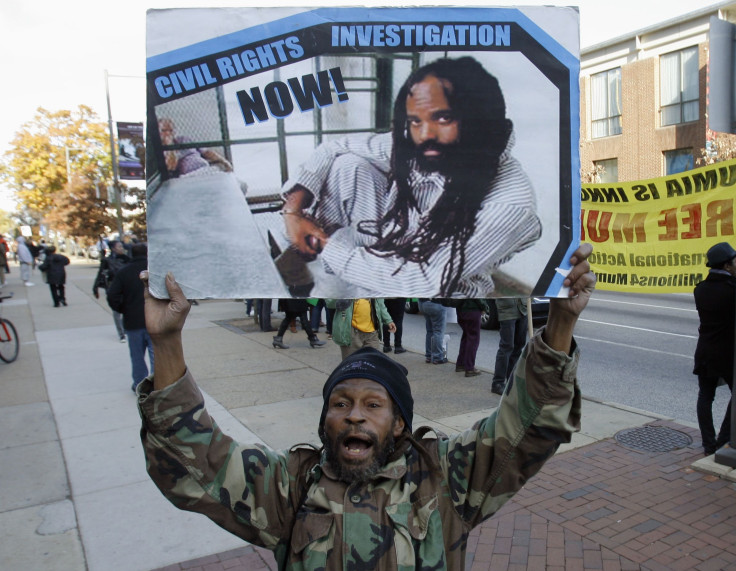Mumia Abu-Jamal: Family Confirms Details Of ‘Very Sick’ Former Black Panther Convicted In 1981 Pennsylvania Police Killing Case

Representatives of Mumia Abu-Jamal’s family confirmed Tuesday that the man serving out a life sentence for the 1981 killing of a Philadelphia policeman was rushed to the intensive care unit of a Pennsylvania hospital Monday night. The family recently disclosed information about the condition of Abu-Jamal, whose murder case has sparked international interest and speculation about the merits of the charges for three decades.
Noelle Hanrahan, a spokeswoman for Prison Radio, a watchdog publication on criminal justice and the corrections industry, said Abu-Jamal’s wife, Wadiya Jamal, had been allowed into his hospital room late Tuesday morning. Reached by phone at the Schuylkill Medical Center in Pottsville, Hanrahan also said the prison had limited visitation and was unsure if the prisoner’s brother and lawyer would be allowed to see him.
Tuesday afternoon, outside of the hospital, Wadiya Jamal told the Philadelphia Inquirer that her husband fainted on Monday in prison due to a diabetic condition. His blood sugar level was very high and remained at more than 300 on Tuesday afternoon, she said, adding that her husband was "very weak."
Hanrahan said officials at the State Corrections Institution at Mahanoy were not allowing non-immediate family members access to Abu-Jamal’s doctors and nurses. A secretary to the prison superintendent verified his visitation limitations, but prison officials did not release information about his condition. However, “he’s very sick,” Hanrahan told the International Business Times.
Abu-Jamal, 60, whose birth name is Wesley Cook, was convicted in 1982 in the killing of Philadelphia Police Officer Daniel Faulkner. After initially being sentenced to death for the Dec. 9, 1981, slaying, Abu-Jamal’s punishment was reduced to life in prison without parole in 2011, concluding a decades-long appeals process that generated intense international interest in the case.
A former radio journalist and member of the Black Panther Party, Abu-Jamal has maintained his innocence in Faulkner’s murder through popular writings, radio broadcasts, public addresses telecast from prison and a book he penned that was released during his imprisonment. Abu-Jamal represented himself in the trial until a lawyer was appointed by the court in 1982. In his defense, the attorney presented character witnesses who disputed the prosecution's theories that Abu-Jamal’s affiliation with the Black Panthers and with an anti-police brutality activist group was proof of his hatred of police.
Prosecutors said Abu-Jamal, a cab driver at the time, had tried to interfere when Faulkner stopped his brother, first shooting Faulkner in the back and then firing several more fatal shots, according to multiple accounts of case. Abu-Jamal’s brother, William Cook, was traveling with a passenger, Kenneth Freeman, whom many of Abu-Jamal’s supporters believe was the shooter responsible for Faulkner’s death. That theory has not been considered in court as, despite a 30-year appeals process, a retrial of the case has not been allowed.
While Abu-Jamal’s murder conviction has been upheld by a federal appeals court, the U.S. Supreme Court ordered the death sentence be vacated because of concerns about the fairness in the sentencing process. After a lower appeals court affirmed the Supreme Court decision, Abu-Jamal was allowed to leave death row in 2012.
© Copyright IBTimes 2024. All rights reserved.






















